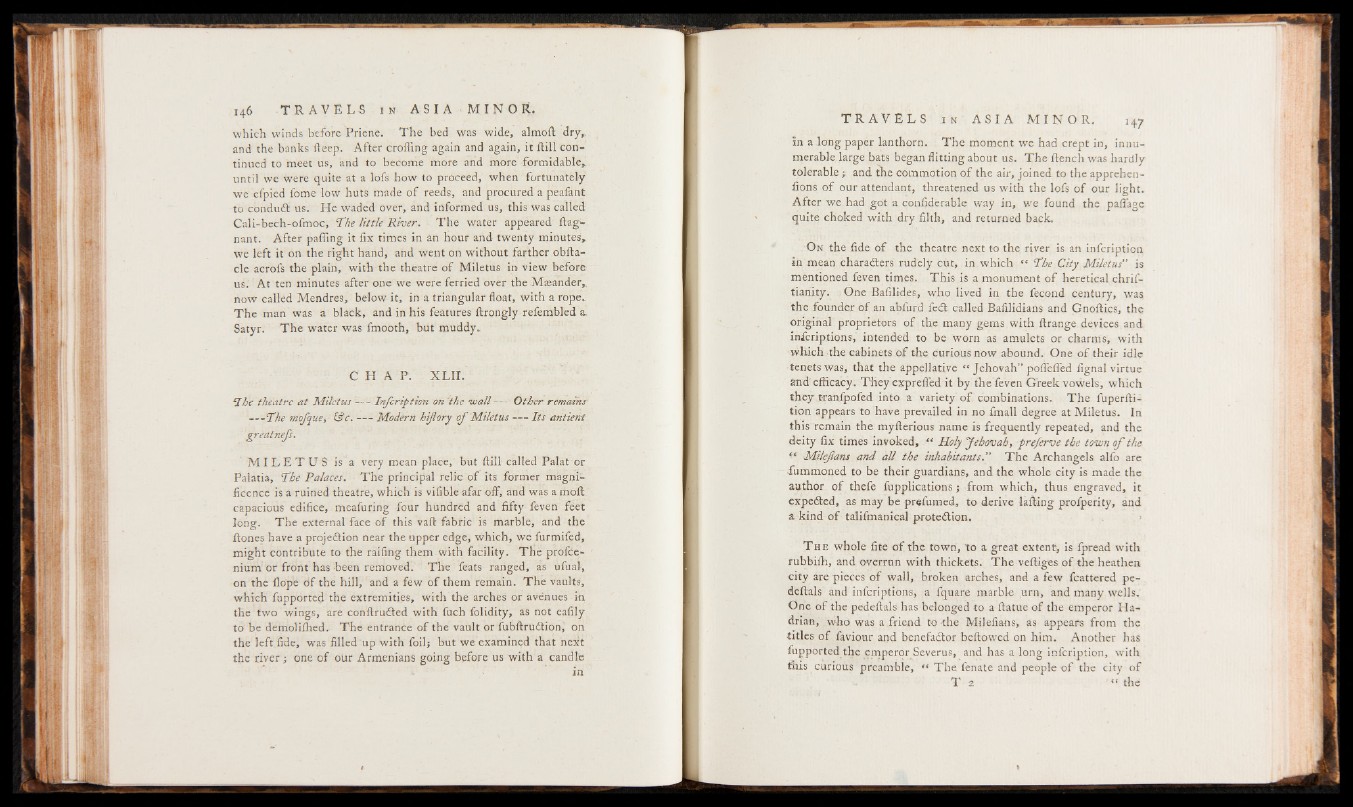
■ which winds before Priene. The bed was wide, almoft dry*
and the banks deep. After crofling again and again, it Hill continued
to meet us, and to become more and more formidable*
until we were quite at a lofs how to proceed, when fortunately
we efpied fome low huts made of reeds, and procured a peafant
to conduit us. He waded over, and informed us, this was called
Cali-bech-ofmoc, The little River. The water appeared ftag-
nant. After palling it fix times in an hour and twenty minutes*
we left it on the right hand, and went on without farther obfta-
cle acrofs the plain, with the theatre of Miletus in view before
us.' At ten minutes after one we were ferried over the Maeander*
now called Mendres, below it, in a triangular float, with a rope.
The man was a black, and in his features ftrongly refembled a.
Satyr. The water was fmooth, but muddy.
C H A P . XLII.
1 he theatre at Miletus — Infer ip tion on the wall — Other remains’
— The mofque, &c. — Modern hijlory of Miletus — Its antient
greatnefs.
M I L E T U S is a very mean place, but Hill called Palat or
Palatia, The Palaces. The principal relic of its former magnificence
is a ruined theatre, which is vifible afar off, and was a moll
capacious edifice, meafuring four hundred and fifty feven feet
long. The external face of this vaft fabric is marble, and the
Hones have a projection near the upper edge, which, we furmifed,
might contribute to the railing them with facility. The profee-
nium or front has -been removed. The feats ranged, as ufual-,
on the Hope df the hill, and a few of them remain. The vault9,
which fupported the extremities, with the arches or avenues in
the two wings, are conftruCted with fuch folidity, as not ealily
to be demolilhed. The entrance of the vault or fubftruCtion, on
the left fide, was filled up with foil; but we examined that next
the river; one of our Armenians going before us with a candle
3 47
In a long paper lanthorn. The moment we had crept in, innumerable
large bats began flitting about us. The flench was hardly
tolerable; and the commotion of the air, joined to the apprehen-
fions of our attendant, threatened us with the lofs of our light.
After we had got a confiderable way in, we found the paflage
quite choked with dry filth, and returned back.
O n the fide of the theatre next to the river is an infeription
in mean characters rudely cut, in which “ The City Miletus" is
mentioned feven times. This is a monument of heretical chrif-
tianity. One Bafilides, who lived in the fecond century, was
the founder of an abfurd feCt called Bafilidians and Gnoftics, the
original proprietors of the many gems with ftrange devices and
inferiptions, intended to be worn as amulets or charms, with
which the cabinets of the curious now abound. One of their idle
tenets was, that the appellative “ Jehovah” poffefled fignal virtue
and efficacy. They exprefled it by the feven Greek vowels, which
they tranfpofed into a variety of combinations. The fuperfti-
tion appears to have prevailed in no fmall degree at Miletus. In
this remain the myfterious name is frequently repeated, and the
deity fix times invoked, “ Holy Jehovah, preferve the town o f the
“ Milefans and all the inhabitants.” The Archangels alfo are
iummoned to be their guardians, and the whole city is made the
author of thefe fupplications ; from which, thus engraved, it
expefted, as may be prefumed, to derive lafting profperity, and
a kind of talifmanical protection.
T he whole fite o f the town, to a great extent, is fpread with
rubbifh, and overrun with thickets. The veftiges of the heathen
city are pieces of wall, broken arches, and a few fcattered pe-
deftals and inferiptions, a fquare marble urn, and many wells.
One of the pedeftals has belonged to a ftatue of the emperor Hadrian,
who was a friend to the Milefians, as appears from the
titles o f faviour and benefactor bellowed on him. Another has
fupported the emperor Severus, and has a long infeription, with
this curious preamble, “ The fenate and people o f the city of
T s “ the